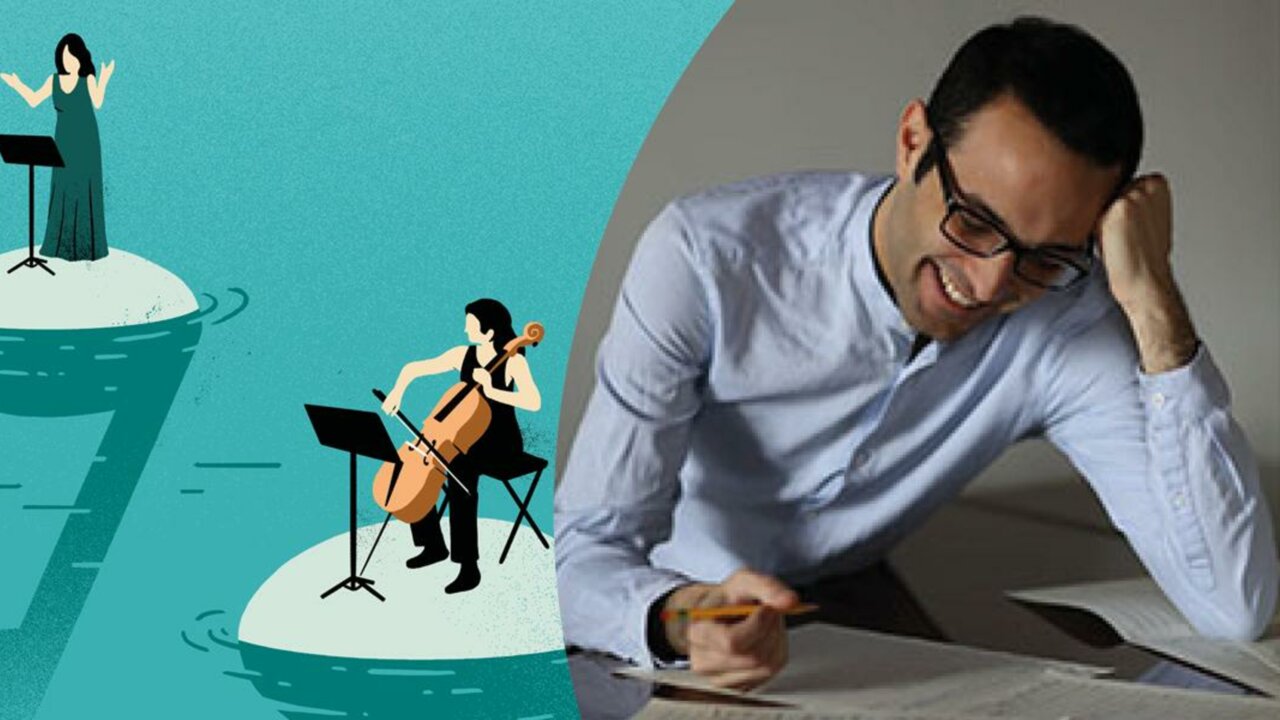
Benjamin Attahir
*1989, Toulouse
Work
Bayn Athnyn for Violin (Viola) and Piano (2020)
Interview
Bayn Athnyn is dedicated to Daniel and Michael Barenboim. The title roughly translates as “Between two.” What’s the idea behind it?
The title of the piece has two meanings: one refers to the special situation which we were thrown into like some sort of “in between:” with unconsciousness, frenzy, and oblivion on one side, and a reminder of our own corporeality, a retreat from the world, and uncertainty on the other. The second meaning—or field of exploration in this score, to be more precise—is the relationship between a father and a son. I wanted to work with the tension between apprenticeship, appropriation, osmosis, and distance that lies at the heart of this human relation.
Michael Barenboim plays both violin and viola in this piece—why did you choose to use both instruments?
During this crisis I felt the urgent need to write music in a way I would write for myself, and in a very reduced and intimate setting which seemed to best capture the reality we live in. When Daniel Barenboim invited me to take part in this wonderful project, it was immediately clear to me that I wanted to write for a classic “sonata” setting, and specifically for the violin—the instrument on which I made my first steps into the world music myself.
And I knew that Michael Barenboim has long wished for a piece in which the violin and the viola would be played successively. I personally find the sonority of the viola almost irresistible: both warm and fragile at the same time, like instruments from earlier eras. The opportunity to try out this special connection was now or never—with a performer and friend I absolutely trust and admire.
At the beginning of the score, you “spell” out the name Barenboim in musical notes—how does this relate to the structure and organization of the piece?
The whole piece is entirely based on this series of notes I derived from the two performers’ second name—this is the first time I ever composed from with a strict and “literal” method. From the beginning to the end of this arch-shaped piece, this original series is presented again and again, without transpositions or permutations. This could be heard as a little nod to the music of Pierre Boulez, whom I’ve had the honor to get advice and encouragement from toward the end of his life.
You know the Pierre Boulez Saal and its acoustics very well, since your piano concerto Al Fajr was premiered here by Daniel Barenboim, Giuseppe Guarrera, and the Boulez Ensemble. Did your experience with the specific space and sound of the hall influence the composition of Bayn Athnyn?
The Pierre Boulez Saal is blessed with unbelievable acoustics and its shape allows for a real closeness between artists and audience. This feeling of being completely enveloped by music has inspired my writing. In this piece we enter into the intimate movements between two beings, ranging from exclamation to discrete intricacies—no other hall would be better suited for this musical reflection.
Born in Toulouse in 1989, Benjamin Attahir trained as a violinist before taking up a career as a composer. He studied composition with Édith Canat de Chizy and later with Marc-André Dalbavie and Gérard Pesson, and worked with Pierre Boulez as part of the Lucerne Festival Academy. He simultaneously completed his education on the violin with Ami Flammer and subsequently performed with the Jersey Chamber Orchestra and the Ensemble intercontemporain, among others. His compositions, which are performed regularly by ensembles such as the Orchestre National de France, Orchestre Philharmonique de Radio France, Helsinki Philharmonic Orchestra, and Ensemble intercontemporain, often blend musical influences and traditions from Europe and the Arab world—they include Al Fajr, a piano concerto premiered by Daniel Barenboim and the Boulez Ensemble for the opening of the Pierre Boulez Saal’s second season in 2017. Among Benjamin Attahir’s most recent works are the opera Le Silence des ombres, which premiered at the Théâtre de la Monnaie in Brussels in 2019, the double concerto Je / suis / Ju / dith for soprano and violin, first performed by Renaud Capuçon, Raquel Camarinha, and the Orchestre national du Capitole du Toulouse, and Jawb for string octet, which was written in 2020 for Michael Barenboim and the West-Eastern Divan Ensemble and will be heard at the Pierre Boulez Saal in May 2021.